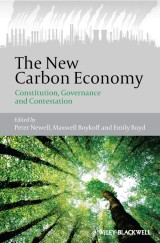Details

The New Carbon Economy
Constitution, Governance and ContestationAntipode Book Series, Band 48 1. Aufl.
|
20,99 € |
|
| Verlag: | Wiley-Blackwell |
| Format: | EPUB |
| Veröffentl.: | 03.02.2012 |
| ISBN/EAN: | 9781118315941 |
| Sprache: | englisch |
| Anzahl Seiten: | 276 |
DRM-geschütztes eBook, Sie benötigen z.B. Adobe Digital Editions und eine Adobe ID zum Lesen.
Beschreibungen
<i>The New Carbon Economy</i> provides a critical understanding of the carbon economy. It offers key insights into the constitution, governance and effects of the carbon economy, across a variety of geographical settings. <ul> <li>Examines different dimensions of the carbon economy from a range of disciplinary angles in a diversity of settings</li> <li>Provides ways for researchers to subject claims of <i>newness</i> and <i>uniqueness</i> to critical scrutiny</li> <li>Historicizes claims of the 'newness' of the carbon economy</li> <li>Covers a range of geographical settings including Europe, the US and Central America</li> </ul>
List of Contributors vii <p>1 The “New” Carbon Economy: What’s New?<br /> <i>Emily Boyd, Maxwell Boykoff and Peter Newell</i> 1</p> <p>2 The Matter of Carbon: Understanding the Materiality of tCO2e in Carbon Offsets<br /> <i>Adam G. Bumpus</i> 13</p> <p>3 Making Markets Out of Thin Air: A Case of Capital Involution<br /> <i>María Gutíerrez</i> 41</p> <p>4 Between Desire and Routine: Assembling Environment and Finance in Carbon Markets<br /> <i>Philippe Descheneau and Matthew Paterson</i> 65</p> <p>5 Ecological Modernisation and the Governance of Carbon: A Critical Analysis<br /> <i>Ian Bailey, Andy Gouldson and Peter Newell</i> 85</p> <p>6 Accounting for Carbon: The Role of Accounting Professional Organisations in Governing Climate Change<br /> <i>Heather Lovell and Donald MacKenzie</i> 107</p> <p>7 Realizing Carbon’s Value: Discourse and Calculation in the Production of Carbon Forestry Offsets in Costa Rica<br /> <i>David M. Lansing</i> 135</p> <p>8 Resisting and Reconciling Big Wind: Middle Landscape Politics in the New American West<br /> <i>Roopali Phadke</i> 159</p> <p>Index 183</p>
<p>“This book should serve as excellent platform to stimulate further scholarly engagement with this extremely important topic.” (<i>New Zealand Geographer</i>, 1 April 2013)</p>
<b>Peter Newell</b> is Professor of International Relations at the University of Sussex. Prior to this he was Professor of Development Studies at the University of East Anglia and held posts at the Oxford University Centre for the Environment, the Centre for the Study of Globalization and Regionalization at Warwick University, the Institute of Development Studies (Sussex), FLACSO Argentina and Climate Network Europe in Brussels. He is associate editor of the journal <i>Global Environmental Politics</i>. His climate publications include <i>Climate for Change</i> (2000), <i>The Business of Global Environmental Governance</i> (2005), <i>Climate Capitalism</i> (2010), and <i>Governing Climate Change</i> (2010). <p><b>Maxwell Boykoff</b> is an Assistant Professor in the Cooperative Institute for Research in Environmental Sciences Center for Science and Technology Policy Research at the University of Colorado-Boulder. In addition, he is a Senior Visiting Research Associate in the Environmental Change Institute at the University of Oxford. His publications include the books <i>Who Speaks for Climate?: Making Sense of Media Reporting on Climate Change</i> (2011), and the edited volume <i>The Politics of Climate Change</i> (2009).</p> <p><b>Emily Boyd</b> is a Reader in Environmental Change and Human Communities in the Department of Geography and Environmental Sciences at the University of Reading. Previously Emily was a lecturer in Environment and Development in the School of Earth and Environment at the University of Leeds, and deputy director of the Leeds University Centre for Global Development. In addition, Emily is also a visiting researcher at Oxford University and the Stockholm Resilience Centre. Her publications include <i>Climate Change a Beginners Guide</i> (2010) and <i>Adapting Institutions, Governance and Complexity: Insights for Social-ecological Resilience</i> (2011, in press).</p>
This book provides a critical understanding of the carbon economy and its central role in society's response to climate change. <p>It brings together a range of disciplinary insights on the question of what might be new about the carbon economy in terms of the way it is constituted, the practices of governance it has generated and the effects it has given rise to in social, political and ecological terms. From local case studies of attempts to enrol forests in carbon markets, to attempts to create regional emissions trading schemes and global offset mechanisms, the book covers the full range of elements of the carbon economy.</p> <p><i>The New Carbon Economy</i> will be of interest to students, academics and activists alike, engaged with, interested in, or critical of, the 'nature' and politics of carbon markets as a response to the threat of climate change.</p>

















